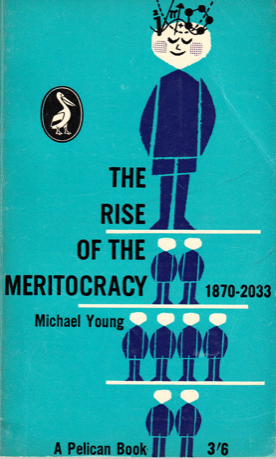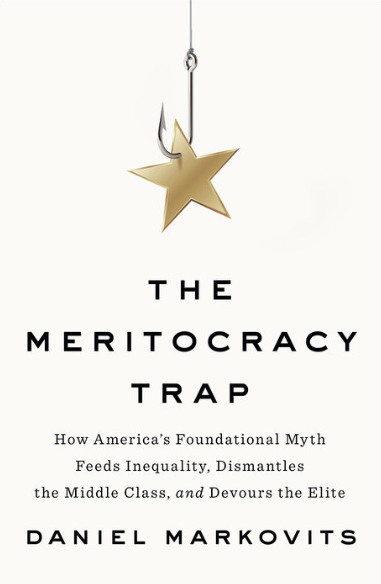A system that is seemingly based on ability has become the new means for exclusion, writes Jomo Kwame Sundaram.
By Jomo Kwame Sundaram
in Kuala Lumpur
Inter Press Service
 How often have you heard someone lamenting or even condemning inequality in society, concluding with an appeal to meritocracy? We like to think that if only the deserving, the smart ones, those we deem competent or capable, often meaning the ones who are more like us, were in charge, things would be better, or just fine.
How often have you heard someone lamenting or even condemning inequality in society, concluding with an appeal to meritocracy? We like to think that if only the deserving, the smart ones, those we deem competent or capable, often meaning the ones who are more like us, were in charge, things would be better, or just fine.
Since the 1960s, many institutions, the world over, have embraced the notion of meritocracy. With post-Cold War neoliberal ideologies enabling growing wealth concentration, the rich, the privileged and their apologists invoke variants of “meritocracy” to legitimize economic inequality.
 Corporations and other social institutions, which used to be run by hereditary elites, increasingly recruit and promote on the bases of qualifications, ability, competence and performance. Meritocracy is thus supposed to democratize and level society.
Corporations and other social institutions, which used to be run by hereditary elites, increasingly recruit and promote on the bases of qualifications, ability, competence and performance. Meritocracy is thus supposed to democratize and level society.
Ironically, British sociologist Michael Young pejoratively coined the term meritocracy in his 1958 dystopian satire, “The Rise of the Meritocracy.” With his intended criticism rejected as no longer relevant, the term is now used in the English language without the negative connotations Young intended.
It has been uncritically embraced by supporters of a social philosophy of meritocracy in which influence is supposedly distributed according to the intellectual ability and achievement of individuals.
Many appreciate meritocracy’s two core virtues. First, the meritocratic elite is presumed to be more capable and effective as their status, income and wealth are due to their ability, rather than their family connections.
Second, “opening up” the elite supposedly on the bases of individual capacities and capabilities is believed to be consistent with and complementary to “fair competition.” They may claim the moral high ground by invoking “equality of opportunity,” but are usually careful to stress that “equality of outcome” is to be eschewed at all cost.
As Yale Law School Professor Daniel Markovits argues in “The Meritocracy Trap,” unlike the hereditary elites preceding them, meritocratic elites must often work long and hard, e.g., in medicine, finance or consulting, to enhance their own privileges, and to pass them on to their children, siblings and other close relatives, friends and allies.
Gaming Meritocracy
Meritocracy is supposed to function best when an insecure “middle class” constantly strives to secure, preserve and augment their income, status and other privileges by maximizing returns to their exclusive education. But access to elite education – that enables a few of modest circumstances to climb the social ladder – waxes and wanes.
 Most middle-class families cannot afford the privileged education that wealth can buy, while most ordinary, government-financed and run schools have fallen further behind exclusive elite schools, including some funded with public money. In recent decades, the resources gap between better and poorer public schools has also been growing.
Most middle-class families cannot afford the privileged education that wealth can buy, while most ordinary, government-financed and run schools have fallen further behind exclusive elite schools, including some funded with public money. In recent decades, the resources gap between better and poorer public schools has also been growing.
Elite universities and private schools still provide training and socialization, mainly to children of the wealthy, privileged and connected. Huge endowments, obscure admissions policies and tax exemption allow elite U.S. private universities to spend much more than publicly funded institutions.
Meanwhile, technological and social changes have transformed the labor force and economies greatly increasing economic returns to the cognitive, ascriptive and other attributes as well as credentials of “the best” institutions, especially universities and professional guilds, which effectively remain exclusive and elitist.
As “meritocrats” captured growing shares of the education pies, the purported value of “schooling” increased, legitimized by the bogus notion of “human capital.” While meritocracy transformed elites over time, it has also increasingly inhibited, not promoted social mobility.
A Different Elite
Thus, although meritocrats like to see themselves as the antithesis of the old “aristocratic” elite, rather than “democratize” society through greater inclusion, meritocracy may even increase inequality and further polarize society, albeit differently.
 While the old “aristocratic” elite was often unable to ensure their own children were well educated, competent and excellent, meritocrats – who have often achieved their status and privileges with education and related credentials – have often increased their significance.
While the old “aristocratic” elite was often unable to ensure their own children were well educated, competent and excellent, meritocrats – who have often achieved their status and privileges with education and related credentials – have often increased their significance.
Hence, a meritocratic system – seemingly open to inclusion, ostensibly based on ability – has become the new means for exclusion, which University of Chicago Professor Raghuram Rajan attributes to the digital revolution.
Meritocrats have increased the significance of schooling, with credential attainment legitimizing growing pay inequality, as they secure even better education for thus own children, thus recreating and perpetuating inequalities.
Recent public doubts about — and opposition to — rising executive remuneration, MBA education, professional guild cartels and labor remuneration disparities reflect the growing delegitimization of ostensibly meritocratic hierarchies and inequalities.
High Moral Ground
To add insult to injury, meritocratic ideology suggests that those excluded are undeserving, if not contemptible. With progressive options lacking middle class and elite support, those marginalized have increasingly turned to “ethno-populism” and other ‘communal’ appeals in this age of identity politics.
Unsurprisingly, their opposition to educational and economic inequalities and marginalization is typically pitted against the ethnic “Other” – real, imagined or “constructed” – typically seen as “foreign,” even if domestic, as the “alien within.”

Build the Wall rally in The Villages, Florida, January 2019. (Whoisjohngalt, CC BY-SA 4.0, Wikimedia Commons)
Markovits argues that meritocracy undermines not only itself, but also democratic and egalitarian ideals. He insists that meritocracy also hurts the new “meritocratic” and “technocratic” elite, hoping to recruit them to the anti-meritocracy cause, perhaps reflecting his appreciation of the need to build broad inclusive coalitions to bring about social transformation.
“Progressives inflame middle-class resentment, and trigger elite resistance while demagogues and charlatans monopolize and exploit meritocracy’s discontents. Meritocratic inequality therefore induces not only deep discontent but also widespread pessimism, verging on despair.”
Reducing Inequality Possible
In the U.S. and elsewhere, tax policy, other incentives and even Covid-19 will encourage replacing mid-skilled workers with automation and highly skilled professionals, e.g., facilitated by the growing use of artificial intelligence applications.
One alternative is to reform labor markets as well as tax policies and regulations to promote more skilled, “middle-class” employment. Those introducing new technologies would then be motivated to enable more productive, higher income, middle-class employment.
A more open, inclusive and broader educational system would also provide the workforce needed for such technologies. Thus, the transitions from school to work, which have tended to increase inequality, can be transformed to reduce inequality.
Rather than de-skill workers to be paid less in order to become more profitable, “up-skilling” workers to be more productive can also be profitable. For example, an Indian cardio-thoracic hospital has trained nurses for many routine medical procedures, allowing specialist doctors to focus on tasks really requiring their expertise.
At relatively lower cost, using workers who are not fully trained doctors, but are paid and treated better, can cost-effectively deliver important healthcare services at lower cost at scale. Such innovations would strengthen the middle class, rather than undermine and erode it.
Jomo Kwame Sundaram, a former economics professor, was United Nations assistant secretary-general for economic development, and received the Wassily Leontief Prize for Advancing the Frontiers of Economic Thought.
The views expressed are solely those of the author and may or may not reflect those of Consortium News.
Please Contribute to Consortium
News on its 25th Anniversary
Donate securely with  PayPal here.
PayPal here.
Or securely by credit card or check by clicking the red button:

This I believe is accurate, Dienne. It’s still meritocratic! But medicine is a good example. It can be a key example. So, Sundaram was on the right track there. But all his prescriptions are wrong, or most of’em I’m remembering. It’s still the domain of theory, what meritocrats are paid to do. “Up scaling” is all theory too IMO. The full hell of supply chain interruptions…the interruptions’ effects over time have yet to be seen. Global slowdown etc…listen to Jack Rasmus, folks. The
de-technologizing will be massive and a shock. People won’t be able to afford it, and parts won’t be available. The robot job warnings will be a joke…are already.
It’s more like Deniz observes…we’re working like dogs. So what happens as a consequence? People break down (not like this should always be the case, but it is now). The big need is for LPNs, CNAs, and now with Covid RNs. We can assume they’ll do tons of what docs did in prior times. So I would say forget all the up scaling, and focus on medical. If the Amazon MO continues, the world won’t be worth it anyway, or will destroy itself. There are tons of technical aspects to giving care, but when you start out it’s the opposite of the bankers’ unreality, and this is the true reward you’ll always have in the profession…a foundation that’s real. Merit or no merit (ha!), that’ll be your reward. The Cuban focus is the right focus. ADVANCE with medicine, not rockets. ADVANCE with medicine, not Amazon. ADVANCE too with the not-big-ag ag Vandana Shiva speaks about. It’s so plain and so out there, people don’t get it. I was hoping this writer would get it here at Consortium, but he doesn’t. Needed also (at this moment) are the $2K checks every month. IMO you can leave the philosophical problems aside. Sleep on’em like you’d do waiting for the meaning of some koan. People won’t have perfect alignment of aptitudes to jobs for a thousand yrs…IF we make any progress that is.
The “Rich” bought up the media in order to control the dialogue and the agenda. Now, they are buying up education in order to teach you “what” to think instead of “how” to think. It creates, dependent workers and docile citizens.
The only profession in which the rewards are completly out of line their contributions and you can ivy league your way to the top is investment banking. The rest of us are working like dogs.
Otherwise, the big money, priviledge and opportunities are just being passed around insiders and their corrupt minions. If you are looking for an example of the modern day American dream in action, you should read the biography of Dick Cheney.
Gattaca!
I am amazed that the meritocracy concept takes so much effort to kill, though surely it does, and I am glad to see Sundaram’s analysis applied to the project.
Meritocracy isn’t. What passes for meritocracy are bribes for the support of power.
“Meritocracy” should be in quotes in the title.
^ This. A real meritocracy is one thing, but this one where all the horses get their legs broken and all the horses with broken legs get shot is not actually based on merit.
“Meritocratic inequality” is a repetitiously redundant phrase.
The antidote is socialism with compassion for the less able, and without false merit for those able.
“Compassion for the less able” is where you lost the average American tho. The level of under the table eugenic attitudes rampant in this country is amazing. Abortions based on deformity/disability, workplace bias on both social and HR levels, social measures that ostracize and ultimately geographically seperate anyone who isn’t perfect enough (notice how all the non homeless untermenschen seem to have disappeared from the streets in metro areas?) and involuntary psychiatry all scream “intolerance”.
Everyone keeps blabbing on about how we defeated those evil nazis with no regard for how we’re becoming them.
“Harrison Bergeron”, perhaps all too prophetic. From Wikipedia, “Harrison Bergeron” is a dystopian science-fiction short story by American writer Kurt Vonnegut, first published in October 1961. Originally published in The Magazine of Fantasy and Science Fiction, the story was republished in the author’s Welcome to the Monkey House collection in 1968. The story received the 2019 Hall of Fame Award from the Libertarian Futurist Society.
I would love to see the meritocracy do their own laundry, fix their own car, unclog their own toilet … when the crash comes and money isn’t worth anything these people will be the first to succumb to the rigors of survival based on actual ability to care and provide for yourself.
The true measure a a man is what he’s worth when he doesn’t have any money.
I’m pretty sure most people do their own laundry (or at least can) and unclog their own toilets. Fixing your own car is kind of a whole different level and the most I can be trusted to do on mine is swap out a fuse, fix a blower motor, and vacuum under the seats. Actual mechanic work? Yikes.
As someone who still does more to take care of myself than say techbros, I find it appalling on a personal level that I was locked up in a psych ward for some supposed inability to take care of myself (real reason: pissed off a cop, and later, my parents). Can you imagine if these people went around locking up everyone who actually struggles to cook a meal or press their collars?
I agree with your argument about so-called meritocracy itself, but your “alternatives” are very weak sauce. Doctors, for instance, while generally well paid, are hardly driving income inequality. Even the highest paid specialties don’t generally break $500,000 per year and most specialties pay substantially less than that. Re-allocating medical responsibilities and restructuring the payscale accordingly will have no impact on inequality.
In fact, where your alternatives fail is that they are all couched within capitalism itself rather than looking beyond transactional/economic based views of work, labor and value. The problem comes when you have ownership and financial classes that can accrue (hoard) vast sums of money while depriving those who are actually contributing the value (i.e., workers) of the rightful compensation. When those same ownership and financial classes are allowed to skip out on taxes because they are “job creators” (cough, cough). When those same classes leverage their vast, uncontestable power to consume competitors, use intellectual property laws to amass profit and shut out competition and take other unfair advantage of their unearned wealth and power.
While education is important and should be opened up, doing so will not alone make any noticeable impact on inequality. We need to recognize that multi-millionaires/billionaires did not “earn” their riches through there merit and do not deserve to hoard wealth at the expense of those who created it.
500k per year isn’t an extravagant amount simply because there are larger extremes? What?
No, $500,000 isn’t that much for someone who’s gone to college/medical school for 8+ years, plus continuing education, plus working a million hours a week with an unpredictable schedule, plus having a literal life-and-death job. If anything, many more of us need to be earning that kind of money. Going after the upper middle class will solve nothing. The problem is with multi-millionaires and billionaires, especially in the finance and insurance sectors where literally nothing of value is produced and the tech/start-up fields where a simple idea like social networking (an idea which Zuckerberg stole from his “friend” anyway) can lead to a multi-billion dollar, world-controlling monopoly.
For the record, no, I’m not a doctor protecting my own pay.
The problem for meritocracy is that it only lasts for one generation. The meritocratic ‘winners’ tend to pass their hard-won privileges onto to their progeny. So the race for social prizes does not start from a level playing field. Meritocracy transmutes into social aristocracy. For my sins I teach kids – 12th grade as you would call it in the US – from privileged backgrounds, they are sons and daughters of successful businesspersons and professionals and with all that comes with this. They want their kids to do well and think that education is the necessary vehicle for this.
There was a time in the UK – roughly between the end of WW2 until 1980s – that there were no real barriers to working class kids getting what was a good education. Speaking for myself, I came from a working class background in south London and took degrees at both Oxford University and the London School of Economics, at zero costs, in fact I was a recipient of government education grants to study. Of course these universities were heavily populated by middle and upper class kids, which was a bit of a culture shock – to them and me – but I had no complaints. I received a first class education for no costs. Meritocracy worked for me, but that was then, of course it is totally different today. I was one of the lucky ones, but social mobility has pretty much closed down. Part of the ongoing neoliberal counter-revolution.
So the solution would seem quite simple then. Reintroduce fully subsidized post secondary education. Socialized education in other words. Like they have in Russia and much of Europe. Yes I remember those good old days in Britain until the Conservatives and neoliberal Labourites did away with a perfectly sustainable system in the name of austerity and maintaining a military that is essentially redundant in this nuclear armed age.
Student debt is a major impediment to equality of outcomes and unnecessarily retards that first step up the social ladder.
In conclusion if socialized education was reintroduced I’d still be for meritocracy as it would work as it should. As opposed to the artificial, basically discriminatory, affirmative action and diversity inclusionary systems that are insulting and demeaning to those who are the recipients of that system. It’s divisive at its core.
“In conclusion if socialized education was reintroduced I’d still be for meritocracy as it would work as it should.”
Um, no, it wouldn’t. It would do nothing to address elite universities, which is where the connections are made to get into the upper echelons of society. It would do nothing about employer’s power over employees, including wage theft and abusive working conditions that allow employers to hoard earnings that should rightfully go to workers. It would do nothing about tax havens that allow the obscenely wealthy to hoard money that should be going into public coffers. It would do nothing about anti-trust and intellectual property violations that allow the biggest corporations to shut out competition. It would do nothing about corporate bailouts and incentives using public money. It would do nothing about 400 years of chattel slavery, Jim Crow, redlining, police violence and scores of other racist practices used to keep Blacks “in their place”. Those reasons and more are why the rich are rich – not because they are “better educated”. Education will fix none of those problems.
Unfortunately tinkering on the margins does nothing to significantly transform the system, however we define it. The system of producing, distributing, and consuming goods and services is designed to produce the (meritocratic) outcomes. I could not be otherwise. The point: a fundamental reshaping is in order. Objections usually play along the lines of small, cosmetic, and so-called pragmatic pathways, that at the end of the day, serve to reinforce the bizarre inequalities amidst a “cornucopia” if not embarrassment of technological and other literacy riches